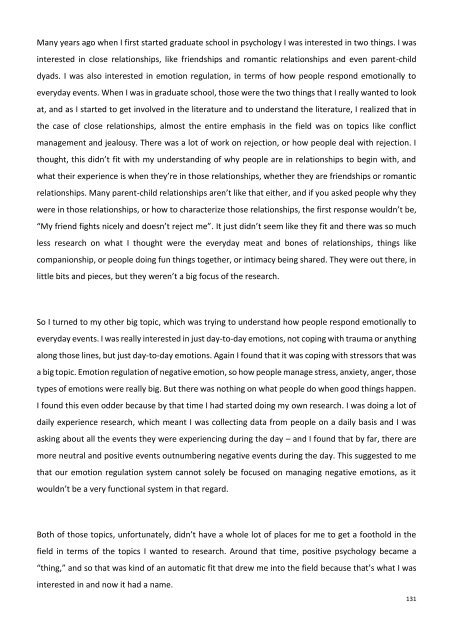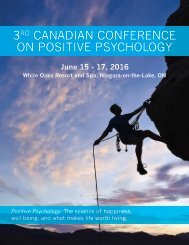Dedications
Positive%20Psychologists%20on%20Positive%20Psychology%203rd%20Vol
Positive%20Psychologists%20on%20Positive%20Psychology%203rd%20Vol
Create successful ePaper yourself
Turn your PDF publications into a flip-book with our unique Google optimized e-Paper software.
Many years ago when I first started graduate school in psychology I was interested in two things. I was<br />
interested in close relationships, like friendships and romantic relationships and even parent-child<br />
dyads. I was also interested in emotion regulation, in terms of how people respond emotionally to<br />
everyday events. When I was in graduate school, those were the two things that I really wanted to look<br />
at, and as I started to get involved in the literature and to understand the literature, I realized that in<br />
the case of close relationships, almost the entire emphasis in the field was on topics like conflict<br />
management and jealousy. There was a lot of work on rejection, or how people deal with rejection. I<br />
thought, this didn’t fit with my understanding of why people are in relationships to begin with, and<br />
what their experience is when they’re in those relationships, whether they are friendships or romantic<br />
relationships. Many parent-child relationships aren’t like that either, and if you asked people why they<br />
were in those relationships, or how to characterize those relationships, the first response wouldn’t be,<br />
“My friend fights nicely and doesn’t reject me”. It just didn’t seem like they fit and there was so much<br />
less research on what I thought were the everyday meat and bones of relationships, things like<br />
companionship, or people doing fun things together, or intimacy being shared. They were out there, in<br />
little bits and pieces, but they weren’t a big focus of the research.<br />
So I turned to my other big topic, which was trying to understand how people respond emotionally to<br />
everyday events. I was really interested in just day-to-day emotions, not coping with trauma or anything<br />
along those lines, but just day-to-day emotions. Again I found that it was coping with stressors that was<br />
a big topic. Emotion regulation of negative emotion, so how people manage stress, anxiety, anger, those<br />
types of emotions were really big. But there was nothing on what people do when good things happen.<br />
I found this even odder because by that time I had started doing my own research. I was doing a lot of<br />
daily experience research, which meant I was collecting data from people on a daily basis and I was<br />
asking about all the events they were experiencing during the day – and I found that by far, there are<br />
more neutral and positive events outnumbering negative events during the day. This suggested to me<br />
that our emotion regulation system cannot solely be focused on managing negative emotions, as it<br />
wouldn’t be a very functional system in that regard.<br />
Both of those topics, unfortunately, didn’t have a whole lot of places for me to get a foothold in the<br />
field in terms of the topics I wanted to research. Around that time, positive psychology became a<br />
“thing,” and so that was kind of an automatic fit that drew me into the field because that’s what I was<br />
interested in and now it had a name.<br />
131



